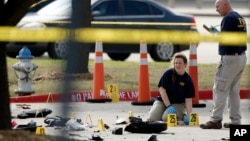Attacks like Sunday's shooting at a Texas event featuring cartoons of the Prophet Mohammad are a bigger threat in the United States than any by foreign
fighters returning radicalized from Syria or Iraq, security experts told a U.S. Senate panel.
The so-called lone wolf attackers will be American, inspired by the Islamic State militant group, radicalized online and have easy access to guns, Peter Bergen of the New America Foundation think tank said at a Senate hearing.
They often will have had no physical contact with recruiters, Bergen added.
"Sunday's attack is a harbinger of what we will see in the future," Bergen told the Homeland Security and Governmental Affairs Committee on Thursday.
U.S. investigators are examining the influence of Islamic State on the two men shot to death by authorities after they opened fire in Garland, Texas. There is no evidence either man traveled to Syria or Iraq but they exchanged Twitter messages with Cybercaliphate, an Islamic State affiliate.
The success of Islamic State in using social media as a recruiting tool was outlined at the hearing.
"Its innovative and aggressive approach has afforded it an unprecendented level of success, and its activities will likely provide a template for future extremist initiatives," said J.M. Berger, an analyst at the Brookings Institution think tank.
Among more traditional recruiting methods, Islamic State has pursued purely online recruiting initiatives, he testified.
Berger said the militant group's supporters online had openly urged attacks on Sunday's event featuring Mohammad cartoons, which are considered offensive by many Muslims.
But it is extremely difficult to anticipate when such online "noise" will translate into a specific attack, he said.
The New America Foundation identified 62 people in the United States from public records or news accounts as having tried to join militant groups in Syria, Bergen said. Of those, he said, there were no clear cases of physical recruitment by a militant operative, radical cleric, returning foreign fighter or radicalization in prison.
He said of the 62, only 19 reached Syria, where eight died.
"Syria is proving as much of a graveyard as a launchpad for such attacks," Bergen said.
The experts agreed there was no single profile for would-be attackers. The sole common element: social media.
"Militants in the United States today radicalize after reading and interacting with propaganda online and have little or no physical interaction with other extremists," Bergen testified.




